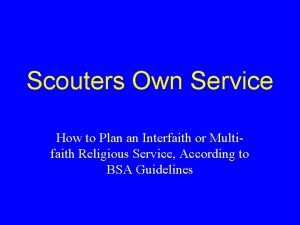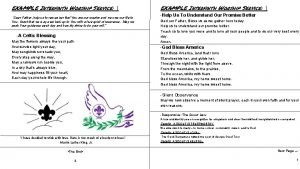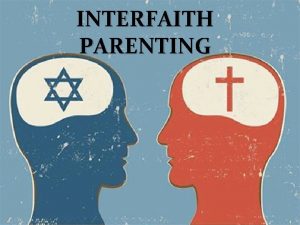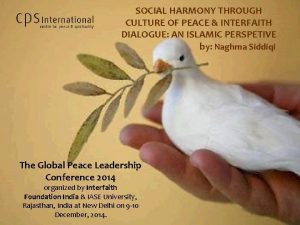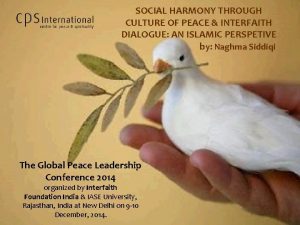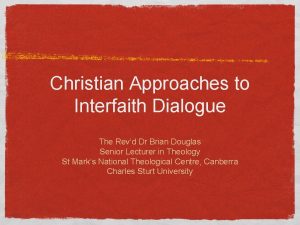Interfaith dialogue 1 Interfaith dialogue The UK is















- Slides: 15

Interfaith dialogue 1

Interfaith dialogue The UK is a multi-faith country, with many different religious and non-religious beliefs. Another way of saying that is that the UK is ‘religiously diverse‘. You’ll come back to this term again. Write down a definition of it now, so that you can look back at it later if you need to. Interfaith dialogue is the process where people from different religions seek to talk and listen to each other about their different beliefs and practices. They hope by doing this that they will remove some of the misunderstandings that can exist between religions, and build friendships and community instead. 2

Use what you know about different beliefs in Britain today to make a list of the similarities and differences between them. You could use the pictures above to help you, and you could also think about : • Beliefs about God • Belief about life • Beliefs about right and wrong • Belief about what happens after death • Places of worship • Festivals 3

What can be the problems and benefits of religious diversity? Living in a country which is religiously diverse can raise important questions for Christians. How should they respond to members of other faiths? What do they and other religions agree and disagree about? How does living alongside other beliefs make life better, and how can it raise difficulties? A survey carried out in 2017 found that 73% of people in the UK think that the country is more divided than is was ten years ago. Of the people who completed the survey, 46% said the biggest cause of tension was between people with different religious views. 1 What problems might be caused by the range of different religions and beliefs in the UK today? What positive things are there about there being many different religions and beliefs in the UK today? 4 1. IPSOS MORI survey ‘A World Divided’

‘They are all the same…’ What is the problem with stereotypes? A stereotype is when people have set ideas about what other types of people are like, generalising about them and ignoring what makes them individuals. They are often negative, and they are almost always oversimplifications. Religions are one area in which stereotypes can be found, and this can lead to problems and a lack of proper understanding. Interfaith dialogue can help people from different faiths to come together to hear and to learn from each other. It can help to overcome some of the stereotypes and therefore increase a sense of community. Why do you think stereotypes develop? Why are stereotypes potentially dangerous? What can we do to stop stereotypes? 5

At the time of the Old Testament, all of the countries around the Israelites believed that there were many different gods. Each god had a different role, such as being the god of the harvest, or the god of war, or the god of the moon. The Israelites were different, because they believed in only one God, with whom they believed they had a special relationship. They knew him by the name ‘Yahweh’. Modern-day Judaism, Christianity and Islam are also monotheistic. Each of these three religions claims to have the correct understanding of the one God. 6 The belief that there is only one god is called ‘monotheism’.

The call to only worship one God, which Christians believe applies to them, can be found in the Ten Commandments. I am the LORD your God, the one who brought you out of the land of Egypt, out of the house of slavery; you shall have no other gods before me. You shall not make for yourself an idol, whether in the form of anything that is in heaven above, or that is on the earth beneath, or that is in the water under the earth. You shall not bow down to them or worship them; for I the LORD your God am a jealous God, punishing children for the iniquity of their parents, to the third and the fourth generation of those who reject me, but showing steadfast love to the thousandth generation of those who love me and keep my commandments. Exodus chapter 20 verses 2 -7 (NRSV) 7 The Ten Commandments were given to the Israelites after the Exodus, their escape from slavery in Egypt. An idol is an image or statue that is worshipped as if it is a god. Worshipping an idol is known as ‘idolatry’. An iniquity is an evil act.

True or false? The Ten Commandments say that the Israelites should not worship other gods apart from Yahweh. The Ten Commandments say that the Israelites are not allowed to make images of gods to worship. The Ten Commandments say that the Israelites are allowed to worship other gods occasionally. The Ten Commandments say that other gods apart from Yahweh don’t exist. What actions does this passage tell the Israelites not to do? What reasons are there in this passage for why the Israelites should worship only their one God, Yahweh? Try to find at least three. 8

However, the Israelites didn’t always follow these rules. Sometimes they made idols and worshipped them, forgetting or ignoring that they weren’t supposed to do that. Prophets like Isaiah were quick to criticise them for this. Who would fashion a god or cast an image that can do no good? Look, all its devotees shall be put to shame; the artisans too are merely human. Let them all assemble, let them stand up; they shall be terrified, they shall be put to shame. Isaiah chapter 44 verses 10 -11 (NRSV) What does Isaiah say about people who make idols? 9 In some Christian churches, statues of Mary or the saints can be seen. These are not idols - though they can be used to help a Christian to focus on God, they are not worshipped in themselves. Modern-day Christians might think of idols as being things that they wrongly prioritise before God. Can you think of some modern-day things that could be idols for a Christian?

Who would fashion a god or cast an image that can do no good? Look, all its devotees shall be put to shame; the artisans too are merely human. Let them all assemble, let them stand up; they shall be terrified, they shall be put to shame. Isaiah chapter 44 verses 10 -11 (NRSV) The idea that idolatry was foolish was because it seemed to treat God as if he could be reduced to just a statue. There was a desire in the Old Testament that Israel should be set apart from other religions, but to worship statues was to just go along with them and do as they did. Choose five words to sum up what these passages from the Old Testament say about Yahweh and other gods. 10

The New Testament accounts of the life of Jesus, the gospels, include many claims made by Jesus about who he was and what his relationship with God was. For example: Jesus said to him, ‘I am the way, the truth, and the life. No one comes to the Father except through me. ’ By ‘the Father’, Jesus means God. John chapter 14 verse 6 (NRSV) Does this statement of Jesus allow for any other religion to be true? 11

What example did Jesus set about relating to others? Christians often look to the example set by Jesus to guide them in how to behave. They will find this in the gospel accounts of Jesus’ life. In them, Jesus sets an example of respect and dialogue with people who were different to him, and Christians might use his example to mean that they can have a positive dialogue with other faiths without feeling that they are compromising on key beliefs. Jesus did not reject people from different cultural backgrounds. He talked to people who were usually seen as inferiors by people at his time, such as Samaritans, women and gentiles (non-Jewish people) as if they were his equals. • He had a conversation with a Samaritan woman, crossing both racial and religious barriers. • He helped a Canaanite woman by healing her daughter from illness. • He healed people no matter who they were and what religion or race they came from, including the servant of a centurion, a Roman soldier. 12

Putting into action Jesus’ call to love your neighbour is one motivation for Christians to engage in interfaith dialogue. Just then a lawyer stood up to test Jesus. ‘Teacher, ’ he said, ‘what must I do to inherit eternal life? ’ He said to him, ‘What is written in the law? What do you read there? ’ He answered, ‘You shall love the Lord your God with all your heart and with all your soul, and with all your strength, and with all your mind; and your neighbour as yourself. ’ And he said to him, ‘You have given the right answer; do this, and you will live. ’ The lawyer would have been an expert in Jewish religious law. Luke chapter 10 verses 25 -28 (NRSV) The scripture that the lawyer used to answer Jesus comes from the Old Testament books of Deuteronomy and Leviticus, and so is common to both Judaism and Christianity. The idea that we should treat others as we want to be treated is often called ‘the Golden Rule’, and can be found in many religions and also in non-religious beliefs such as Humanism. 13 Research the Golden rule and find out how it appears in the sacred texts and writings of other religions and worldviews.

Look back over all of your work on this topic. What do the Bible passages we have used say about how Christians should think about other religions, and how they should relate to them? Choose one answer from these three boxes that you think best sums up what Christians believe about the truth in other religions. 14 A ‘All religions should be respected and seen as having truth in them. These truths might be different from each other and we should accept that. Perhaps all religions have some truth in them. ’ B ‘Other religions might contain things that are true and that we can learn from, but only Christianity can bring salvation. We should engage with other religions respectfully and meaningfully, following the example of Jesus. ’ C ‘Only Christianity is true, and all other religions aren’t, so followers of other religions have no hope of being saved and reaching heaven. ’

In fact, all of those are believed by some Christians, but the majority would probably agree with B. B ‘Other religions might contain things that are true and that we can learn from, but only Christianity can bring salvation. We should engage with other religions respectfully and meaningfully, following the example of Jesus. ’ The Hindu leader Mohandas Gandhi said, ‘Different religions are beautiful flowers from the same garden, or they are branches from the same majestic tree. ’ How far would Christians agree with him? Try to use knowledge from throughout this topic to explain how Christians think about interfaith dialogue. 15 Scripture quotations are from the New Revised Standard Version Bible, copyright © 1989 National Council of the Churches of Christ in the United States of America. Used by permission. All rights reserved worldwide.
 Where is christianity's hearth
Where is christianity's hearth Interfaith neighbors
Interfaith neighbors Scouts own service ideas
Scouts own service ideas Interfaith worship service
Interfaith worship service Intrafaith conflict definition
Intrafaith conflict definition Congrats dialogue
Congrats dialogue 101012 bằng
101012 bằng Tỉ lệ cơ thể trẻ em
Tỉ lệ cơ thể trẻ em Lời thề hippocrates
Lời thề hippocrates đại từ thay thế
đại từ thay thế Quá trình desamine hóa có thể tạo ra
Quá trình desamine hóa có thể tạo ra Các môn thể thao bắt đầu bằng tiếng chạy
Các môn thể thao bắt đầu bằng tiếng chạy Công thức tính thế năng
Công thức tính thế năng Hát kết hợp bộ gõ cơ thể
Hát kết hợp bộ gõ cơ thể Sự nuôi và dạy con của hươu
Sự nuôi và dạy con của hươu Thế nào là mạng điện lắp đặt kiểu nổi
Thế nào là mạng điện lắp đặt kiểu nổi


